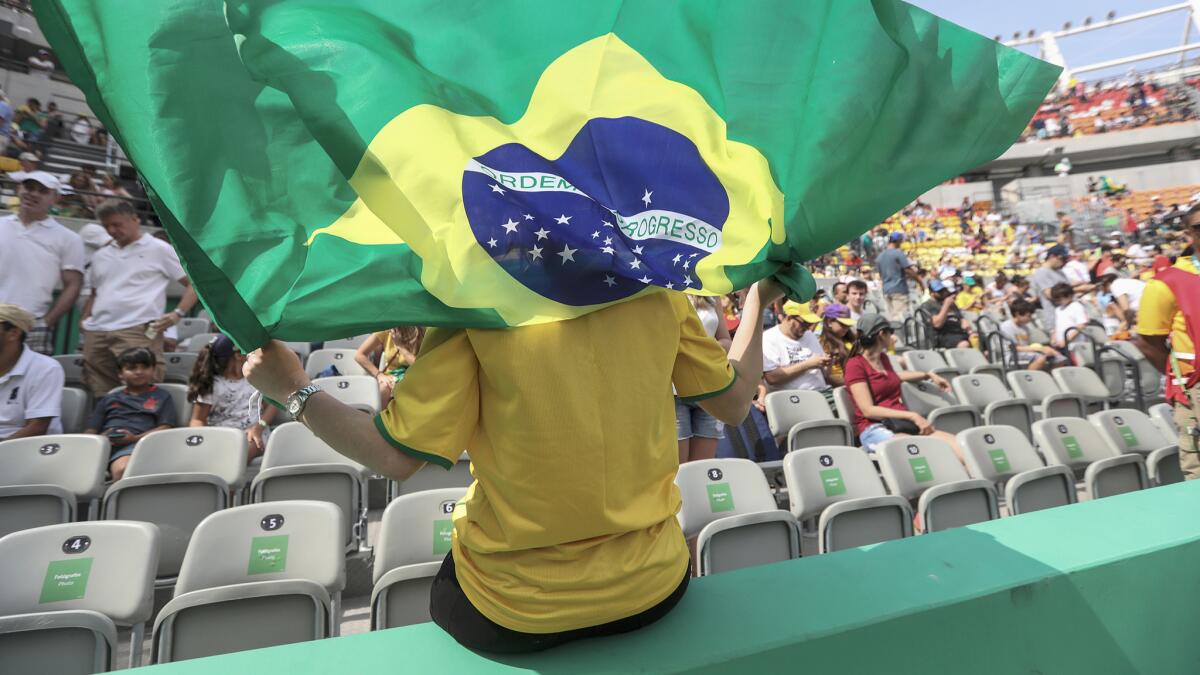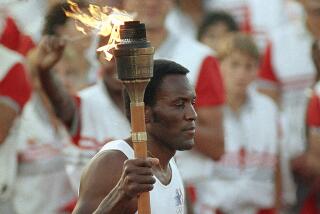Brazilians slowly warming to Olympic fever

A sudden windstorm burst through Olympic Park on Sunday morning, toppling bright red umbrellas and upending garbage cans, scattering bits of litter everywhere.
As dust devils spun across the plaza, a group of local teenagers dressed in their national colors of green and yellow came dancing along, oblivious to the weather, clapping their hands and chanting: “Brasilia.”
On the second day of competition in the 2016 Summer Games, it seemed that – like storm clouds on the horizon – excitement might be brewing in a country that has seemed indifferent about hosting this mega-sporting event.
“In the beginning, we were shy,” said Luciane Contani, who came from the southern state of Parana with her husband, Eduardo, to watch tennis. “Now, we are beginning to participate.”
As the weekend drew to a close, sports such as swimming, basketball and soccer were drawing exuberant – if less-than-capacity – crowds.
Still, the Brazilians have a ways to go.
Not a single event was sold out on the first day and only 82% of tickets had been purchased as of Sunday morning. In an uncommon sight for the Games, people could walk up to kiosks at Olympic Park and in the city to purchase same-day seats for an array of sports.
Mario Andrada, a spokesman for the Rio 2016 organizing committee, asked for patience.
“I believe the Brazilian fans, who are the majority of the crowd, are learning to love and how to appreciate sports,” he said.
Six months ago, on a trip to Los Angeles, Andrada had insisted that sluggish ticket sales were to be expected. At that time, about 50% of seats remained unsold.
“Brazilians are late buyers,” he said. “So far you don’t have enough experience to understand that.”
His country had plenty of reasons not to warm to the Olympics.
More than $10 billion has been poured into staging the Games at a time when the country is suffering through a deep recession and political turmoil. In the favelas – the ramshackle neighborhoods all around Rio – residents have wondered why that money wasn’t spent on healthcare, education and other basic services.
Improvements to the infrastructure, such as a new metro line, will serve mostly wealthier areas.
“A few people will benefit in the community,” said Ricardo Duarte Ferreira, who lives in the Rocinha favela. “It could have been much better.”
Things got off to a tepid start when women’s soccer played in Belo Horizonte, about 220 miles north, last week. Attendance at four games – featuring marquee teams in the U.S. and France – averaged less than 10,000 at a stadium that had been packed for the 2014 World Cup.
Down in Copacabana, near the beach volleyball venue, 23-year-old Bruna Schuenck epitomized her country’s apathy.
“At first, I didn’t think it was so great,” she said of Brazil hosting the Olympics. “Now it’s OK.”
If there was a potential turning point, it occurred with the opening ceremony at Maracana Stadium on Friday night.
Limited by budget cuts, the organizers produced a relatively inexpensive show – no big special effects – that nonetheless drew positive reviews both at home and abroad for its music, dance and exuberance.
“When we had the World Cup, that opening ceremony was very poor,” Eduardo Contani remembered while waiting in line at the tennis stadium snack bar. “This ceremony was beautiful and people got excited.”
Growing enthusiasm showed in attitude – if not pure numbers – the last two days.
At a women’s rugby game in Deodoro, a scant crowd danced in the stands and did their best to sing along to Neil Diamond’s “Sweet Caroline.” Locals joined sides with a Fijian contingent, cheering as the island team defeated Colombia.
“We are passionate people in Brazil,” said Andres dos Santos, a Rio resident. “We want to show the world that, even if many seats are empty.”
Fans at a U.S.-China men’s basketball game did the wave, cheered for the NBA stars and showed their hoops savvy by booing when Clippers center DeAndre Jordan struggled from the free-throw line.
At the swim stadium in Olympic Park, a late-arriving crowd filled only about three-quarters of the stands but was so loud that the public address announcer had to hush them so swimmers could hear the start.
“Crazy,” said American swimmer Cody Miller.
In some cases, the country’s zeal for these Games has extended only as far as the home team is concerned.
Brazilians abruptly exited halfway through the program when their team’s athletes finished competition at the tennis and fencing venues. The Briger family from Palo Alto, Calif., saw the same thing happen at beach volleyball.
“The stadium was packed,” 13-year-old William said. “After the Brazilians won, literally everyone left.”
Along the coast in Barra, road cyclists whizzed past beachgoers who seemed more intent on sunbathing or walking along the sand. Only a few people stood at the barricades, actually watching the race.
Susan Moser, a Swiss woman who is married to a Brazilian man, suspected the Games might truly catch fire if the host country contends for a gold medal in men’s soccer.
“Or beach volleyball,” she said. “The things Brazilians are good at.”
david.wharton@latimes.com
Nathan Fenno, Teddy Greenstein, Helene Elliott, Lisa Dillman, Stacy St. Clair and Kevin Baxter contributed to this report.
More to Read
Go beyond the scoreboard
Get the latest on L.A.'s teams in the daily Sports Report newsletter.
You may occasionally receive promotional content from the Los Angeles Times.






